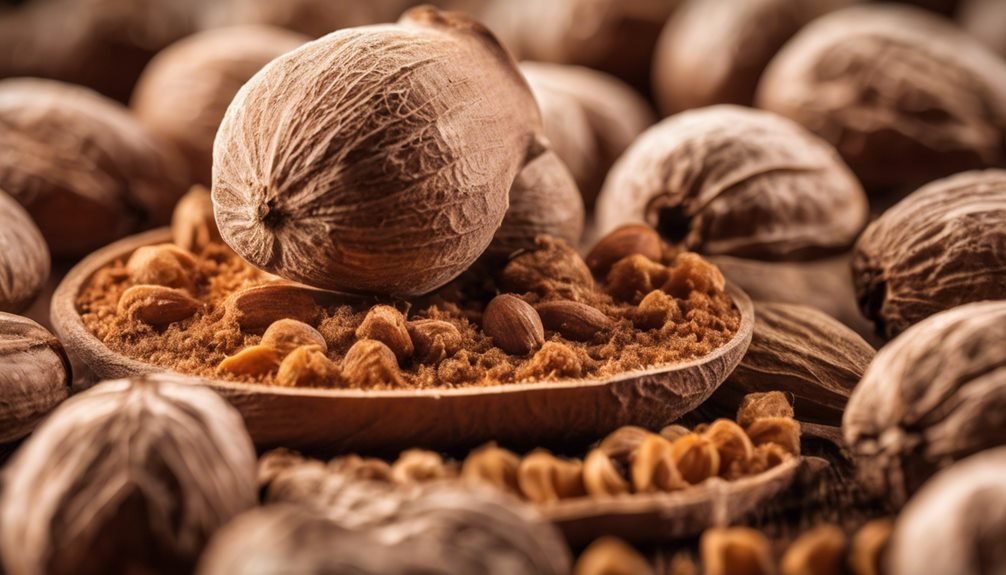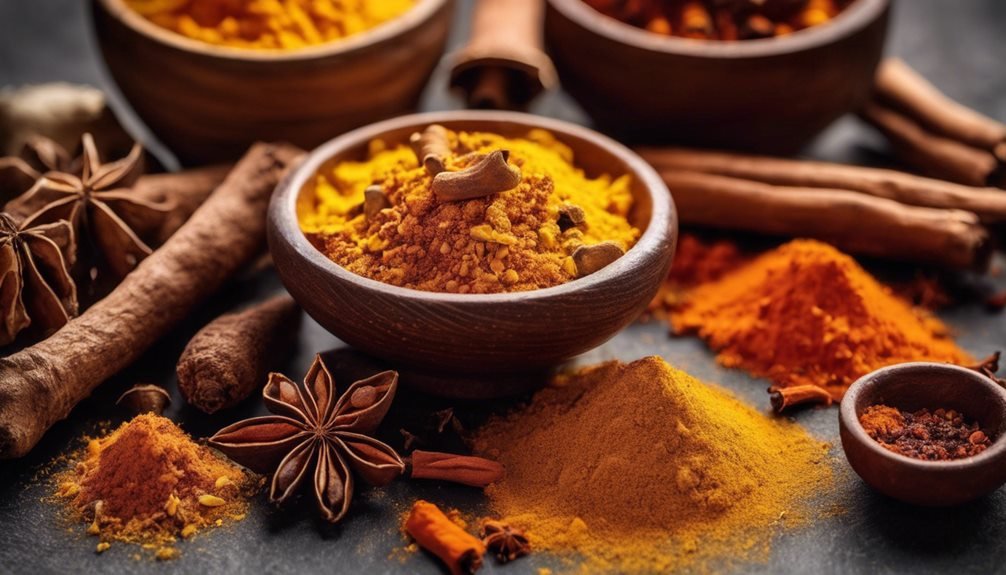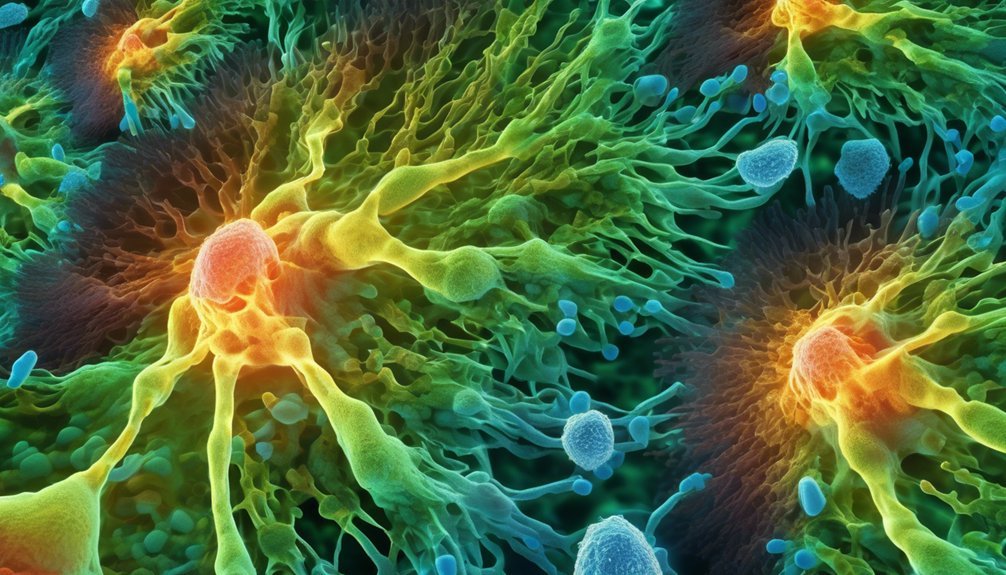As you ponder the seasoning choices in your kitchen, consider this: spices hold potential in the prevention of cancer. The intricate compounds within turmeric, ginger, garlic, and other common spices exhibit promising anti-cancer properties. But how exactly do these flavorful additions to your meals contribute to cancer prevention? Let's explore the subtle yet impactful ways in which these spices may serve as a shield against one of the most formidable health challenges of our time.
Key Takeaways
- Turmeric's curcumin inhibits cancer cell growth and has anti-inflammatory properties.
- Gingerol in ginger inhibits cancer cell growth and reduces side effects of treatments.
- Garlic's organosulfur compounds have anti-inflammatory effects and boost the immune system.
- Cinnamon's compounds induce cancer cell death and reduce chronic inflammation.
- Nutmeg's antioxidants protect cells, reduce oxidative stress, and potentially inhibit tumor growth.
Cancer-Fighting Properties of Turmeric
Turmeric, a vibrant yellow spice commonly used in cooking, has garnered attention for its potential cancer-fighting properties. Studies have shown that turmeric contains bioactive compounds, such as curcumin, which exhibit anti-cancer effects. These turmeric compounds have been found to interfere with various molecular pathways involved in cancer development, including cell proliferation, apoptosis, and metastasis.
Curcumin, the most researched compound in turmeric, has demonstrated promising results in both laboratory and animal studies for its potential in cancer prevention. It has been shown to inhibit the growth of various types of cancer cells, induce programmed cell death, and prevent the formation of new blood vessels that support tumor growth.
Moreover, turmeric compounds have been found to possess anti-inflammatory and antioxidant properties, which are also crucial in cancer prevention. By reducing inflammation and oxidative stress in the body, turmeric may help lower the risk of developing cancer and support overall health and well-being. Incorporating turmeric into your diet may be a simple yet effective way to harness its cancer-fighting benefits.
Ginger's Anti-Cancer Effects
With a long history of medicinal use dating back centuries, ginger has emerged as a potent contender in the realm of cancer prevention. Ginger possesses antioxidant benefits that play a crucial role in combating cancer. One of the key compounds in ginger responsible for its anti-cancer effects is gingerol. Gingerol exhibits powerful anti-inflammatory effects that help in reducing inflammation, which is closely linked to the development of cancer.
Studies have shown that gingerol can inhibit the growth of cancer cells and induce apoptosis, or programmed cell death, in various types of cancer, including ovarian, colorectal, and pancreatic cancer. Additionally, ginger has been found to help in reducing the side effects of conventional cancer treatments like chemotherapy.
Incorporating ginger into your diet can be a simple yet effective way to harness its anti-cancer properties. Whether consumed fresh, as a spice in cooking, or in the form of ginger tea, this versatile ingredient can be a valuable addition to your cancer prevention regimen.
Garlic and Its Potential Benefits

Garlic, a widely used culinary ingredient, has garnered attention for its potential health benefits, particularly in the realm of cancer prevention. Research suggests that garlic contains compounds with anti-cancer properties, making it a valuable addition to your diet. When considering the benefits of garlic, it's important to explore both consuming it in food and using garlic supplements.
Garlic Benefits Table
| Benefit | Description | Evidence |
|---|---|---|
| Anti-inflammatory Effects | Garlic contains organosulfur compounds that may help reduce inflammation, a key factor in cancer development. | Studies have shown a decrease in inflammatory markers after garlic consumption. |
| Antioxidant Properties | The antioxidants in garlic can help protect cells from damage caused by free radicals, potentially reducing cancer risk. | Garlic has been linked to enhanced antioxidant enzyme activity in the body. |
| Immune System Support | Compounds in garlic may boost the immune system, aiding in the body's defense against cancer cells. | Research suggests garlic may enhance immune cell activity. |
| Cardiovascular Health | Garlic has been associated with promoting heart health, which is crucial for overall well-being and potentially preventing cancer. | Studies have shown garlic's positive effects on cholesterol levels and blood pressure. |
| Anti-Cancer Potential | Garlic's compounds, like allicin, have demonstrated anti-cancer effects in various studies, showing promise in cancer prevention. | Some research indicates garlic may inhibit the growth of cancer cells. |
When incorporating garlic into your diet, explore different cooking methods to retain its beneficial properties. Additionally, for those looking to supplement their intake, garlic supplements can be considered. Remember, moderation is key, and consulting with a healthcare professional is always advisable before making significant dietary changes.
Cinnamon's Role in Cancer Prevention
Cinnamon, a common spice found in kitchens worldwide, has gained attention for its potential role in cancer prevention. Studies suggest that cinnamon possesses unique mechanisms that could contribute to its anti-cancer properties. One key mechanism is its ability to inhibit the growth and spread of cancer cells.
Cinnamon contains compounds like cinnamaldehyde and cinnamic acid, which have been shown to induce cell death in various types of cancer cells.
Furthermore, research indicates that cinnamon's efficacy in cancer prevention may be attributed to its anti-inflammatory and antioxidant properties. Chronic inflammation and oxidative stress are known to play significant roles in cancer development, and cinnamon's ability to counteract these processes could be beneficial in reducing cancer risk.
While more studies are needed to fully understand the extent of cinnamon's impact on cancer prevention, incorporating this flavorful spice into your diet may offer potential health benefits. Consider adding cinnamon to your meals, desserts, or beverages as an easy way to potentially support your overall well-being.
Nutmeg's Impact on Cancer Cells

Nutmeg, a popular spice known for its warm and slightly sweet flavor, has been the focus of research investigating its potential impact on cancer cells. Studies have shown that nutmeg exhibits antioxidant effects, which play a crucial role in protecting cells from damage caused by free radicals. These antioxidant properties can help prevent the development of cancer by reducing oxidative stress and inflammation within the body.
Furthermore, nutmeg has been found to induce apoptosis in cancer cells. Apoptosis is a process of programmed cell death that helps eliminate damaged or abnormal cells from the body. By promoting apoptosis in cancer cells, nutmeg has the potential to inhibit the growth and spread of tumors, thus serving as a promising natural compound in cancer prevention.
Incorporating nutmeg into your diet can be a simple yet effective way to harness its potential benefits in supporting overall health and potentially reducing the risk of cancer. Remember to use nutmeg in moderation and in combination with a balanced diet rich in various spices and herbs for optimal health benefits.
Cardamom and Cancer Prevention
Cardamom, a fragrant spice commonly used in culinary applications, has garnered attention for its potential role in cancer prevention. Recent studies on cardamom have shown promising results in the realm of cancer prevention. Research indicates that cardamom contains compounds that possess anti-inflammatory and antioxidant properties, which are crucial in combating cancer development.
To delve deeper into the potential benefits of cardamom in cancer prevention, let's explore a comparison of key components found in this spice:
| Compound | Function |
|---|---|
| α-Terpinyl acetate | Anti-inflammatory properties |
| Limonene | Antioxidant effects |
| Eucalyptol | Potential anti-cancer properties |
| β-Pinene | Cellular protective role |
These components work synergistically to potentially inhibit the growth of cancer cells and reduce inflammation within the body. Incorporating cardamom into your diet may be a flavorful way to enhance your health and well-being, while also contributing to your overall cancer prevention strategies.
Cloves as Anti-Cancer Spices

Building upon the potential of spices in cancer prevention, cloves emerge as a noteworthy contender in the realm of anti-cancer spices. Cloves contain compounds that exhibit anti-inflammatory properties, which play a crucial role in preventing cancer development. Chronic inflammation has been linked to the initiation and progression of various types of cancer, making the anti-inflammatory effects of cloves particularly valuable in cancer prevention.
Furthermore, cloves are rich in antioxidants, such as eugenol, which help neutralize harmful free radicals in the body. Free radicals can cause damage to cells and DNA, potentially leading to cancer. By scavenging these free radicals, antioxidants in cloves can help protect cells from mutations that may trigger cancerous growth.
Incorporating cloves into your diet or using them in cooking can be a simple yet effective way to harness their anti-cancer properties. Consider adding cloves to your favorite dishes or beverages to not only enhance flavor but also potentially contribute to your overall health and well-being.
Black Pepper's Cancer-Fighting Potential
With a history dating back to ancient times, black pepper stands out as a spice that exhibits promising cancer-fighting potential. When considering black pepper's cancer-fighting properties, it's essential to explore the different pepper varieties and their potential mechanisms. Here are some key points to consider:
- Pepper Varieties: Black pepper comes in various forms, such as whole peppercorns, ground pepper, and even specialty varieties like Tellicherry or Malabar pepper. Each type may offer unique compounds that contribute to its potential health benefits.
- Potential Mechanisms: Studies suggest that the piperine compound found in black pepper may play a role in inhibiting the growth of cancer cells. Additionally, black pepper is rich in antioxidants that can help combat oxidative stress, a key factor in cancer development.
Furthermore, research indicates that black pepper may have anti-inflammatory properties that could contribute to its cancer-fighting potential.
Coriander's Anti-Cancer Properties

Coriander, known for its distinct flavor and culinary versatility, is also recognized for its potential anti-cancer properties. Coriander contains bioactive compounds such as flavonoids, phenolic acids, and terpenoids, which have been studied for their ability to inhibit the growth of cancer cells and induce apoptosis, or programmed cell death. These bioactive compounds exhibit antioxidant properties, protecting cells from oxidative stress and DNA damage that can lead to cancer development.
Coriander's antioxidant properties help neutralize free radicals in the body, reducing the risk of cell mutations that may contribute to tumor formation.
Research suggests that coriander's bioactive compounds may interfere with various pathways involved in cancer progression, including inflammation, angiogenesis, and metastasis. By targeting these pathways, coriander shows potential as a natural anti-cancer agent that could complement traditional cancer treatments.
Incorporating coriander into your diet may offer a flavorful way to harness its anti-cancer properties and contribute to overall health and well-being.
Cumin and Cancer Prevention
Cumin, a widely used spice known for its warm and earthy flavor, has garnered attention for its potential role in cancer prevention. Research on cumin has highlighted several mechanisms through which it may contribute to reducing cancer risk:
- Antioxidant Properties: Cumin is rich in antioxidants that help combat oxidative stress, a known factor in the development of cancer.
- Anti-Inflammatory Effects: Studies suggest that cumin may possess anti-inflammatory properties, which can help in preventing chronic inflammation linked to cancer.
- Potential Anti-Cancer Compounds: Compounds found in cumin, such as thymoquinone, have shown promise in inhibiting the growth of cancer cells in lab studies.
These insights from cumin research provide a foundation for further exploration into its potential role in cancer prevention. Incorporating cumin into your diet may offer not only its distinctive flavor but also potential benefits in reducing cancer risk.
Paprika's Role in Reducing Cancer Risk

Paprika, a vibrant spice derived from dried red peppers, has been the subject of research exploring its potential role in reducing cancer risk. Studies suggest that paprika possesses potent antioxidant properties due to the presence of compounds like carotenoids, capsaicin, and vitamins A and C. These antioxidants help neutralize free radicals in the body, which can otherwise damage cells and lead to cancer development.
Furthermore, paprika has been linked to reducing inflammation, a key factor in the initiation and progression of cancer. By inhibiting inflammatory processes, paprika may help lower the risk of certain types of cancer.
Incorporating paprika into your diet could be a flavorful way to benefit from its potential cancer-fighting properties. Whether sprinkled on roasted vegetables or added to soups and stews, paprika offers not only a burst of taste but also a potential shield against cancer through its antioxidant and anti-inflammatory effects.
Chili Peppers and Cancer Prevention
Chili peppers, commonly known for their fiery flavor, have garnered attention in the realm of cancer prevention due to their potential health benefits. Capsaicin research suggests that this compound found in chili peppers may play a role in preventing cancer by inhibiting the growth of cancer cells and inducing cell death in various types of cancers. Some of the benefits of spicy foods, such as chili peppers, in cancer prevention include:
- Capsaicin's ability to reduce inflammation, which is linked to the development of cancer.
- The potential of capsaicin to inhibit the spread of cancer cells and prevent tumor formation.
- The presence of antioxidants in chili peppers that can help protect cells from damage that may lead to cancer development.
Incorporating chili peppers into your diet in moderation could be a flavorful way to potentially lower your cancer risk. Stay informed about ongoing capsaicin research and consider adding a dash of spice to your meals for a potentially beneficial impact on your health.
Frequently Asked Questions
Are There Any Side Effects of Consuming These Cancer-Fighting Spices?
When considering the consumption of cancer-fighting spices, it's essential to be aware of potential risks and long-term effects. While spices are generally safe when consumed in moderation as part of a balanced diet, excessive intake may lead to issues such as gastrointestinal discomfort or allergic reactions in some individuals.
It's crucial to consult with a healthcare provider or nutritionist to ensure that you're using spices safely and effectively.
Can These Spices Be Used as a Substitute for Cancer Treatment?
Spice alternatives can complement traditional cancer treatment, but they shouldn't substitute it. Treatment options like chemotherapy, radiation, and surgery have been extensively researched and proven effective.
While spices may have some potential benefits against cancer, relying solely on them could be risky. Always consult with your healthcare provider to develop a comprehensive treatment plan that incorporates evidence-based practices for the best chance of successful outcomes.
How Should These Spices Be Incorporated Into the Diet for Maximum Benefits?
To fully harness the power of spices for health benefits, adopt a culinary adventure. Experiment with various cooking techniques like grilling, sautéing, or roasting to enhance flavors and nutrient absorption.
Incorporate spices into your daily consumption schedule by adding them to morning smoothies, lunch salads, and dinner dishes.
Try creating new recipes with a diverse array of spices to maximize their potential health-boosting effects.
Are There Any Specific Types or Forms of These Spices That Are More Effective?
To maximize spices effectiveness, opt for whole forms like fresh turmeric or ginger root. These whole spices can be grated or minced for culinary applications, enhancing both flavor and potential health benefits.
Ground spices can also be effective, but may lose potency over time. Incorporate these whole or ground spices into various dishes like soups, stir-fries, or teas to reap their full benefits. Remember, freshness is key for optimal results.
Can These Spices Interact With Medications or Medical Conditions?
Potential interactions between spices and medications or medical conditions exist, raising safety concerns. Some spices may interfere with drug effectiveness or exacerbate health issues. It's crucial to consult healthcare providers before combining spices with medications, especially if you have chronic conditions or are on specific drugs.
Monitoring for adverse effects and adjusting treatment plans accordingly can help mitigate risks associated with these interactions. Always prioritize your health and well-being by seeking professional guidance.
Conclusion
Incorporating cancer-fighting spices like turmeric, ginger, garlic, cinnamon, nutmeg, cloves, black pepper, coriander, cumin, paprika, and chili peppers into your diet can potentially reduce your risk of developing cancer. While some may argue that spices alone cannot prevent cancer, scientific research supports their anti-inflammatory, antioxidant, and anti-cancer properties. By consistently including these spices in your meals, you can harness their natural benefits and support overall health and well-being.





